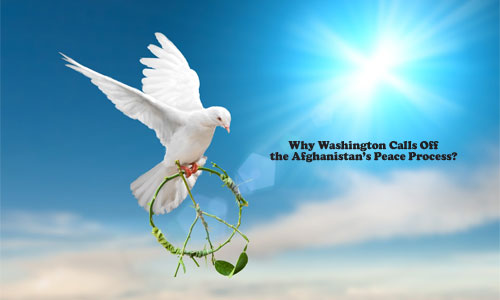The US President Donald Trump said through a series of tweets that he was cancelling the peace talks with Taliban leaders after a car bombing in Kabul killed one U.S. service member and 11 others. Trump said in a tweet that he had been planning secret meetings with the Afghan President Ashraf Ghani and senior Taliban leaders at David Camp on Sunday. “I immediately canceled the meeting and called off peace negotiations,” Trump wrote on Twitter, “What kind of people would kill so many in order to seemingly strengthen their bargaining position?” The U.S. President said if the Taliban cannot agree to a “ceasefire during these very important peace talks” then they probably don’t have the power to negotiate a meaningful agreement anyway.
The negotiations have been underway since last winter, when Mr. Trump’s special envoy for Afghanistan, Zalmay Khalilzad, began regular trips to Doha, Qatar, for grueling sessions with Taliban representatives. Finally the talks ended a draft agreement which faced with widespread criticism inside and outside of the United States. It means, in addition to the US soldier event, the Americans top leaders want to show that no negotiation is better than bad negotiation. Nine former US officials who already served in Afghanistan issued a joint statement that the US troop’s withdrawal would lead to another civil war in the country. A former US envoy to Afghanistan, Jamie Kong-ham, said that the agreement would not create required conditions for peace; thus, Ryan Crocker described the agreement as very dangerous. They emphasized that the withdrawal of US troops from Afghanistan before a real peace deal with the Taliban would face a full-blown civil war in the country.
According to some sources, Mike Pompeo was also not satisfied with the US peace deal with the Taliban; as a report quoted, he said that America was ready to sign the agreement but not any ridiculous agreement. Meanwhile, US Secretary of Defense, Mark Spar, said that his country is making efforts to reach a political agreement with the Taliban but these efforts do not mean that the US will accept “any deal” with the Taliban.”We want to make sure we reach a favorable agreement; an agreement that at least guarantees the security of the United States and specify a clearer path for the Afghan people,” he said. The US House Foreign Relations Committee had also asked Zalmai Khalilzad to explain the provision of the agreement in the House.
In Afghanistan, the Afghan Presidency expressed concerns about the implications of the agreement and called the United States to explain the agreement consequences. The second vice president had also reacted to the deal calling mentioning or formality of the “Islamic Emirate” in the agreement is unjustifiable. The Civil Society Network Working Group has also expressed concerns over the achievements of the past two decades and called for the preservation of these achievements in Afghanistan.
In general, there were several points which were more highlighted inside Afghanistan: firstly, the terms of the agreement had been adjusted accordance with interests and demand of Taliban only. The contents of agreement could create a mentality as if they were able to force the United States and the international community to leave Afghanistan through the military forces. Secondly, the term of “Islamic Emirate” in the context of the agreement was reminiscent of the Taliban’s most important demand and extreme ideology. It was interpreted that the Islamic Emirate is the Taliban’s red line and that the group will never give up on the demand. Thirdly, the negotiations fully marginalized the Afghan government and Afghan people. No Afghan had role in codification of the draft agreement text, and even it was not available to the government until the recent days. This issue could cause the Taliban feel prideful and superior during the intra-Afghan peace talks. Fourthly, the agreement cared about security of the United States and its allies but nothing mentioned about security of Afghan government and Afghan people after the withdrawal of international forces. Fifthly, the agreement does not say anything about a global ceasefire in Afghanistan, and only predicted a limited ceasefire between the US and the Taliban. Based on this, war, suicide attacks, bloodshed and other types of crimes could continue after the agreement. Thus, the agreement does not specify who will take the power after the withdrawal of foreign troops from Afghanistan. Electoral government, transitional government or …
Overall, the agreement mainly focused only on demands of Taliban and the withdrawal of US troops from Afghanistan. It paid no attention to Afghan people and past achievements neglecting its deleterious consequences for the country. Therefore, many Afghan people have warmly welcomed the Trump’s decision urging not to gamble on the future and fate of Afghan people with its irresponsible withdrawal from Afghanistan. it must be stressed that the democratic political system in Afghanistan is common point between Afghan people and the US government. This common point can be changed to a real friendship between the two countries through ensuring a sustainable peace in Afghanistan. Therefore, the US leaders should not allow Khalilzad or anyone to record another Vietnam in the history of that country just for the sake of certain personal tendencies.
Meanwhile, it is also the responsibility of Afghan government to protect the supreme interests of the country against terrorists and their supporters. We must not allow the country to be repeatedly invaded by terrorist groups and other foreign elements. The political circles and political leaders must not try to victimize national interests against their own personal and family interests.
Home » Opinion » Why Washington Calls Off the Afghanistan’s Peace Process?
Why Washington Calls Off the Afghanistan’s Peace Process?
| Mohammad Zahir Akbari

